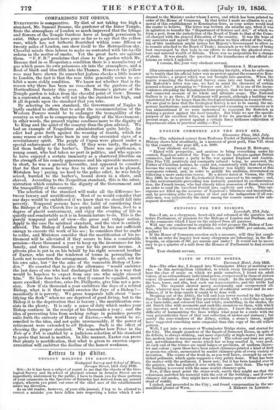COMPARISONS NOT ODIOUS.
EVERYTHING is comparative. By dint of not taking too high a standard, Mr. Samuel Broome, the gardener of the Inner Temple, finds the atmosphere of London so much improved that the foliage and flowers of the Temple Gardens have at length permission to exist. Other gardeners have gone so far as to say that the yellow rose, which has not hitherto flourished within some fifteen or twenty miles of London can show itself to the Metropolitan sky. Cheerful minds thus labour to make us contented with bit-by-bit reform in the matter of smoke. Yet the great facts are against them. "F. F. B." proclaims that close to the garden which Mr. Broome find in so Hesperian a condition there is a manufactory of gas which pours its own poisonous air into the atmosphere, and a flood of black and blue filth into the Thames. However the yellow rose may have shown its somewhat jealous cheeks a little nearer to London, the fact is that the rose tribe generally seems to ex- hibit a more sickly- condition. We know not whether that is the reason why there has been no rose-show at the gardens of the Horticultural Society this year. Mr. Broome's picture of the Temple garden is taken from the cheerful point of view: Broome is a contented man, who will not take the standard too high, and it all depends upon the standard that you take. By selecting its own standard, the Government of Naples is jst1y enabled to affuln that to ado ot the recommendation of the Western Powers would be to en' er the tranquillity of the country as well as to compromise theI • ity of the Government; in other words, the present regime conduces more to the dignity of • he King and.the quiet of the country than the plan advised. We had an example of Neapolitan administration quite lately. An edict had gone forth against the wearing of beards' which for some reason or other have been in our day accounted signs of a revolutionary spirit. The people of Capua were placed under a special enforcement of this edict. If they were tardy, the police led them bodily to the barber's. There was one gentleman, a young count, who had taken no part in polities and who appears to have enjoyed a certain immunity as a chartered libertine on the strength of his comely appearance and his agreeable manners; in short, he was a general favourite, and appeared to consider that for that reason he was free to shave or not as he pleased. Mistaken boy ! paying no heed, to the police edict, he was lately seized, hurried to the barber's, bound down in a chair, and shaved. According to the Neapolitan standard, this is the 'admi- nistration which conduces to the dignity of the Government and the tranquillity of the country. The-selection of the standard will make all the difference be- tween luxury and mortification. Most of us would consider that our days would be embittered if we knew that we should fall into poverty-. Temporal persons have the habit of considering that the Bishops of the Church live in purple and fine linen, feed to a degree of placid contentment, and enjoy the evening of life as quietly and comfortably as it is in human nature to do. This is the purely temporal point of view—the gross and vulgar notion. ,Apply to the ease the spiritual standard., and the view is entirely altered. The Bishop of London finds that he has not sufficient energy to execute the work of his see; he considers that he ought to retire, and Ministers consider that the mortification of his re- tirement will be alleviated if they secure to him a comfortable pension—three thousand a year to keep up the insurances for his family, and three thousand a year for his present income. A piteous plea is put in on his behalf by his right reverend brother of Exeter, who used the tenderest of terms in persuading the Lords not sanction the arrangement. He spoke he said, not for his own sake, but "for the sake of the venerable Bishop of Lon- don." He asserted that to give the allowance "would embitter the last days of one who had discharged his duties in a way that would be hopeless to expect from any one who might succeed him." He has done his work so that it cannot be equalled, much more excelled; therefore, cries Dr. Phillpotts, give linn not a pen- sion. Now if six thousand a year embitters the days of a retired Bishop, what is it that would sweeten the days of a Bishop ?- manifestly it is poverty. We gross temporals talk about " mor- tifying the flesh" when we are deprived of good living, but to the Bishop it is the deprivation that is luxury ; the mortification con- sists in theplenty. It is only a sense of duty which makes your Bishop continue in the receipt of his thousands a year ; and the idea of preventing him from seeking refuge in penniless poverty calls forth the entreaty of Henry of Exeter,—who would be re- conciled to the idea, and not quite unreasonably, if the power of retirement were extended to all Bishops. Such is the effect of choosing the proper standard. We remember how Peter in the Tale of a Tub is enabled by a judicious selection of his standard to prove that bread is mutton. In like manner, Exeter can prove that plenty is mortification, that what is given to sweeten super- annuation will embitter the decline of the honest workman.


























 Previous page
Previous page